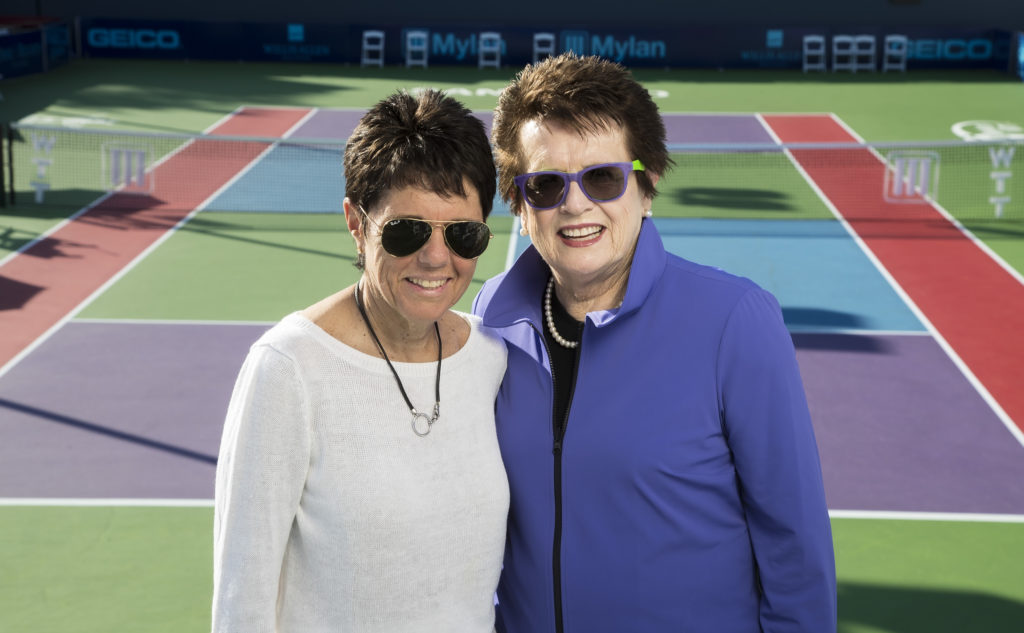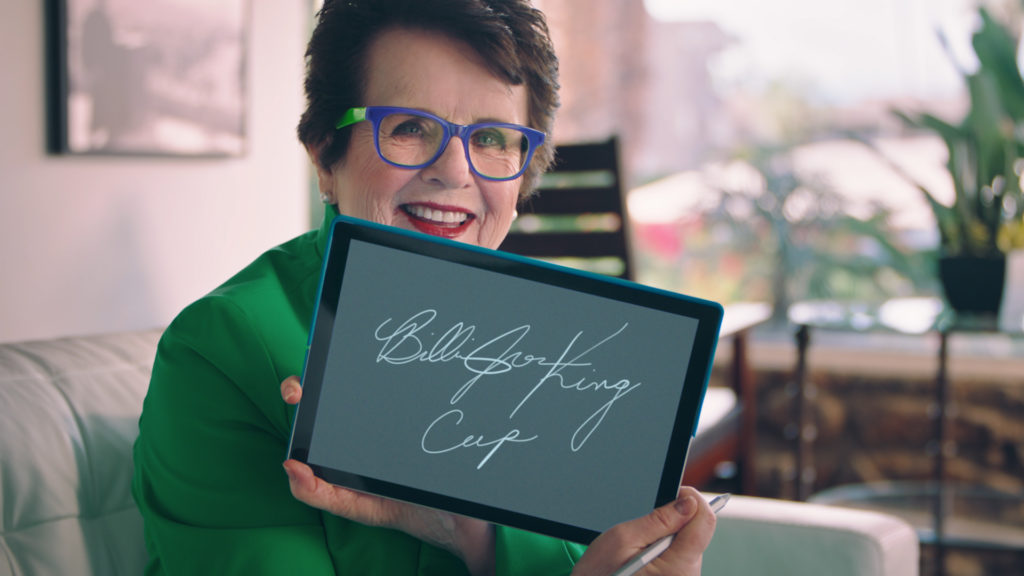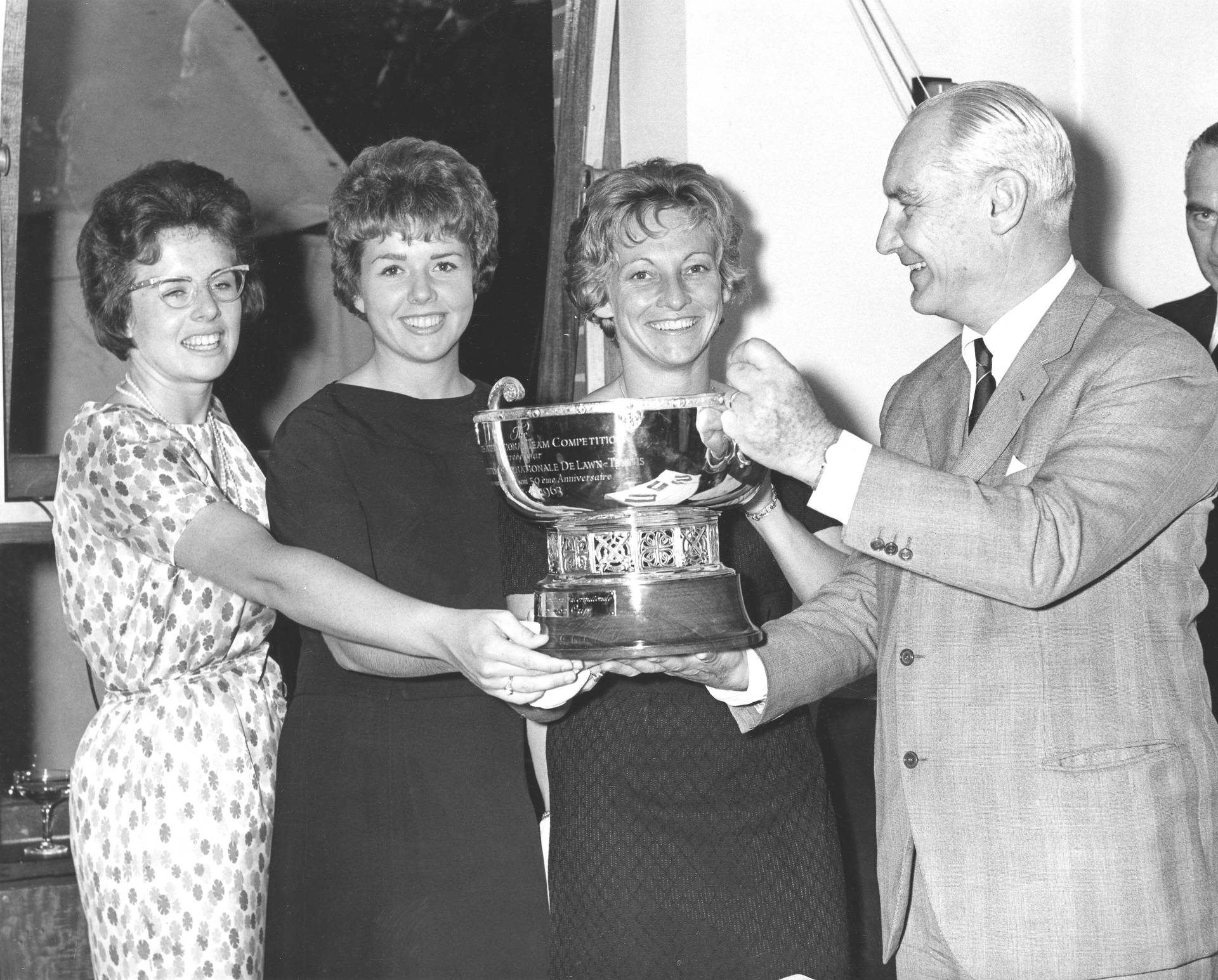In the lingo of her game, Billie Jean King still aches to win the big points.
Never mind that King has collected 39 Grand Slam titles (20 at Wimbledon alone), formed the Women’s Tennis Association to advance gender equity in the sport, co-founded the only co-ed, professional team sports league and, of course, bettered Bobby Riggs in the epic “Battle of the Sexes” match.
Set aside for a quick second that, in recent years, the tennis icon accepted the Presidential Medal of Freedom as an advocate for women and the LGBTQ community then launched a nonprofit to cultivate diverse leadership in the workforce – and that “champion of equality” has basically become her unofficial title.
At 76, King lives by an oft-repeated mantra, four words she always delivers with a smile: “I’m not done yet.”
“When people tell Billie, ‘Wow, you have accomplished a lot,’ she says, ‘I have to keep reinventing. My job now is to support the next generation,’” says Ilana Kloss, president of Billie Jean King Enterprises, a former pro player and King’s partner. “For Billie, technology is a huge part of that impact.”

Ilana Kloss, left, with Billie Jean King. (Photo by Susan Mullane/Camerawork USA)
On Thursday, that impact continued to expand. The Fed Cup – the largest annual women’s team sports competition, pitting professional tennis players from more than 100 nations – was rebranded as the Billie Jean King Cup by BNP Paribas.
Also Thursday, the International Tennis Federation (ITF) and Microsoft announced a collaboration to provide new technologies to enhance the sport of tennis. The tools include a customized dashboard that will provide professional coaches and players with real-time data analytics generated by their current matches.
The dashboard gets its first in-game use next April in Budapest, Hungary at the finals of the Billie Jean King Cup by BNP Paribas, where teams from 12 nations will compete for the trophy.
“Any time my name is on anything, particularly the ‘Women’s World Cup of Tennis’ … I really have a sense of responsibility,” King says. “It reminds me to keep looking forward, to keep (going) every single moment, every single day, keep going toward equality.”
Transform recently spoke via Microsoft Teams with Kloss at her home in New York and with Jamie Capel-Davies, head of the ITF’s science and technical department, at his home in London to hear how these tech advances, built with Microsoft Azure services, will benefit tennis.
TRANSFORM: Ilana, I understand that you and Billie saw a vision for the collaboration with Microsoft and the ITF – a sense that new technologies could elevate play at the tournament finals, where coaching is allowed and team play is embraced. Can you tell me about that vision?
KLOSS: I have worked with Billie for probably 30 years. She’s always about technology and information. She’s always felt that tennis could really use both.
Billie always wants to know more. And she always says how she would have loved to have been born in this era, because of all the information and analytics available to the players. She believes they can help not only the players but the sport and the fans.
TRANSFORM: Do the launch of the dashboard and the rebranding of the competition signal a distinct, new era for this tournament and maybe for the game itself?
KLOSS: Absolutely. Billie is all about breaking barriers, making things better and using all the technology. For her to have her name on the cup at a competition where the latest and the best technology is available to help the players and the team captains is, for Billie, one of the most exciting things. She believes we have to pass the baton to the next generation.

The ITF’s Jamie Capel-Davies.
TRANSFORM: Jamie, the dashboard will analyze real-time data on player movement and shots, ball flight and speed – data generated by the ball-tracking cameras and 3D-radar systems used at pro tennis events. How do you see coaches and players applying this new info during the tournament finals in April?
CAPEL–DAVIES: If you’re a player, among the things you always want to know are: Where should I be serving and what speeds do I need to hit to be able to serve an ace? The dashboard offers those analytics.
TRANSFORM: Ilana, same question.
KLOSS: You want to know the points you are winning because certain points in a game are important. I think also knowing which side the opposing player is stronger on, where players serve on certain big points, positioning on the court – where you are and where they are.
TRANSFORM: Jamie, you work at the ITF lab, which tests rackets, balls and court surfaces to preserve the essence of the game while encouraging innovation. Is there a balance between welcoming tech advances like this dashboard with protecting the game’s traditions?
CAPEL–DAVIES: A while ago, there was maybe more of a conflict between innovation and tradition. Now, there’s definitely more appetite for innovation. Tennis, like a lot of sports, is looking over its shoulder at some of the other sports, at computer games, at eGames.
There’s a willingness to try stuff out and maybe not be overprotective. There’s also a realization that you can do both – maintain tradition and introduce innovation without it necessarily being disruptive.
TRANSFORM: Ilana, you played in the 1970s at Wimbledon, the U.S. Open, French Open, the Fed Cup and more. How do you see the addition of new tech meshing with the sport’s adherence to its traditions and lore?
KLOSS: I feel like sometimes the men’s and women’s tours are very conservative in terms of trying new things. Players hate change. Most people hate change.
But sometimes actually not changing is the greater risk. Billie and I have always believed that our sport could be so much better if it embraces technology.
TRANSFORM: Jamie, there are 17 Microsoft Azure services powering the data repository and data filtering inside the dashboard. That offers players and coaches quite an in-the-moment plan for how to win their match.
CAPEL–DAVIES: Yes, it’s the combination of real-time data with a historical perspective. We have data going back several years. You might have already played this particular player. So what happened in that previous match? What are their strengths and weaknesses? What did you do that was effective and that you might want to try and repeat?

King celebrates the cup’s new name.
TRANSFORM: Ilana, Billie has long fought for the idea that everyone should get an opportunity and a seat at the table. Strictly on a tennis level, does this platform meet that lofty philosophy by offering a new way to share data and analytics – and maybe give more players a chance at greatness?
KLOSS: That’s a very good point. In this team competition, it’s huge because everyone will have access to the information.
Sometimes, on the tour, if you can’t afford the best coach, you’re not getting access to the same information that, say, Serena Williams gets from her team.
A wonderful thing about this partnership with Microsoft, the Billie Jean King Cup and the ITF is that over 116 countries participate in this competition. Their ability to now tap into the data – and to use that information for their federations and their local teams – can be a game-changer. It’s about providing access. That’s where we can really make a difference.
Top photo: Billie Jean King, left, and two teammates accept their trophy for winning the 1963 Fed Cup. (Photo courtesy of the International Tennis Federation.)


